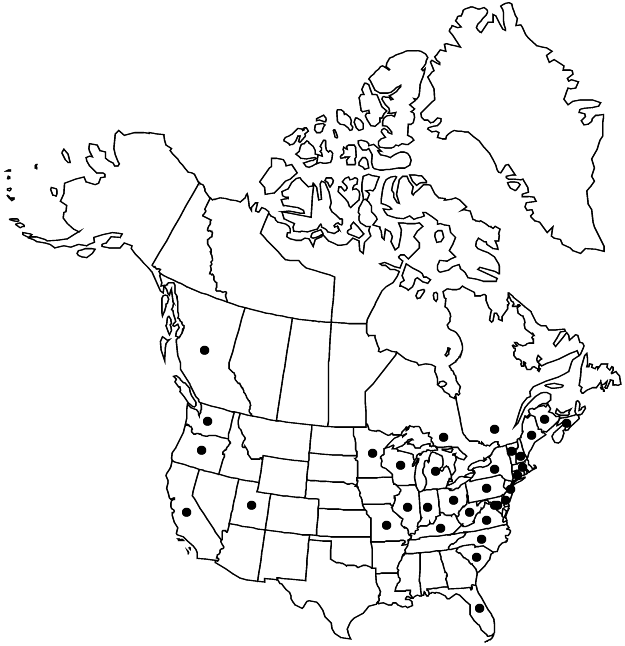Difference between revisions of "Silene armeria"
Sp. Pl. 1: 420. 1753.
FNA>Volume Importer |
FNA>Volume Importer |
||
| Line 27: | Line 27: | ||
|elevation=0-1200 m | |elevation=0-1200 m | ||
|distribution=B.C.;N.B.;N.S.;Ont.;Que.;Calif.;Conn.;Del.;D.C.;Fla.;Ill.;Ind.;Ky.;Maine;Md.;Mass.;Mich.;Minn.;Mo.;N.H.;N.J.;N.Y.;N.C.;Ohio;Oreg.;Pa.;S.C.;Utah;Vt.;Va.;Wash.;W.Va.;Wis.;Europe. | |distribution=B.C.;N.B.;N.S.;Ont.;Que.;Calif.;Conn.;Del.;D.C.;Fla.;Ill.;Ind.;Ky.;Maine;Md.;Mass.;Mich.;Minn.;Mo.;N.H.;N.J.;N.Y.;N.C.;Ohio;Oreg.;Pa.;S.C.;Utah;Vt.;Va.;Wash.;W.Va.;Wis.;Europe. | ||
| − | |discussion=<p>The long-tubular, clavate calyx enclosing the unusually long carpophore helps to distinguish Silene armeria. It is an occasional and adventive garden escape.</p> | + | |discussion=<p>The long-tubular, clavate calyx enclosing the unusually long carpophore helps to distinguish <i>Silene armeria</i>. It is an occasional and adventive garden escape.</p> |
|tables= | |tables= | ||
|references= | |references= | ||
| Line 52: | Line 52: | ||
|publication year=1753 | |publication year=1753 | ||
|special status= | |special status= | ||
| − | |source xml=https://jpend@bitbucket.org/aafc-mbb/fna-data-curation.git/src/ | + | |source xml=https://jpend@bitbucket.org/aafc-mbb/fna-data-curation.git/src/8f726806613d60c220dc4493de13607dd3150896/coarse_grained_fna_xml/V5/V5_345.xml |
|subfamily=Caryophyllaceae subfam. Caryophylloideae | |subfamily=Caryophyllaceae subfam. Caryophylloideae | ||
|genus=Silene | |genus=Silene | ||
Revision as of 17:38, 18 September 2019
Plants annual, glabrous throughout, ± glaucous, sometimes glutnous in distal parts; taproot slender. Stems simple, branched in inflorescence, (10–)20–40(–70) cm. Leaves: basal withering before flowering, blade lanceolate-spatulate, 2–5 cm; cauline sessile to amplexicaulous, blade lanceolate to ovate or elliptic, 1–6 cm × 5–25 mm, apex acute. Inflorescences cymose, bracteate; cyme capitate or with flowers clustered at end of slender branches; bracts lanceolate-acicular, 2–10 mm. Pedicels 0.1–0.5 cm. Flowers: calyx usually purple tinged, 10-veined, elongate, clavate, lobed, constricted proximally into narrow tube, 13–17 × 2.5–4 mm, rather membranous; lobes ovate-triangular, ca. 1 mm, apex obtuse; petals pink (rarely white), unlobed, limb obovate, ca. 5 mm, base cuneate into claw 6–8 mm, auricles absent, appendages linear to lanceolate, 2–3 mm, apex acute; stamens slightly longer than petal claws; styles 3(–4), exserted. Capsules oblong, 7–10 mm, opening by 6 (or 8) spreading teeth; carpophore 7–8 mm, glabrous. Seeds dark brown, reniform-rotund, less than 1 mm diam., rugose. 2n = 24 (Europe).
Phenology: Flowering summer.
Habitat: Waste places, disturbed ground
Elevation: 0-1200 m
Distribution

B.C., N.B., N.S., Ont., Que., Calif., Conn., Del., D.C., Fla., Ill., Ind., Ky., Maine, Md., Mass., Mich., Minn., Mo., N.H., N.J., N.Y., N.C., Ohio, Oreg., Pa., S.C., Utah, Vt., Va., Wash., W.Va., Wis., Europe.
Discussion
The long-tubular, clavate calyx enclosing the unusually long carpophore helps to distinguish Silene armeria. It is an occasional and adventive garden escape.
Selected References
None.